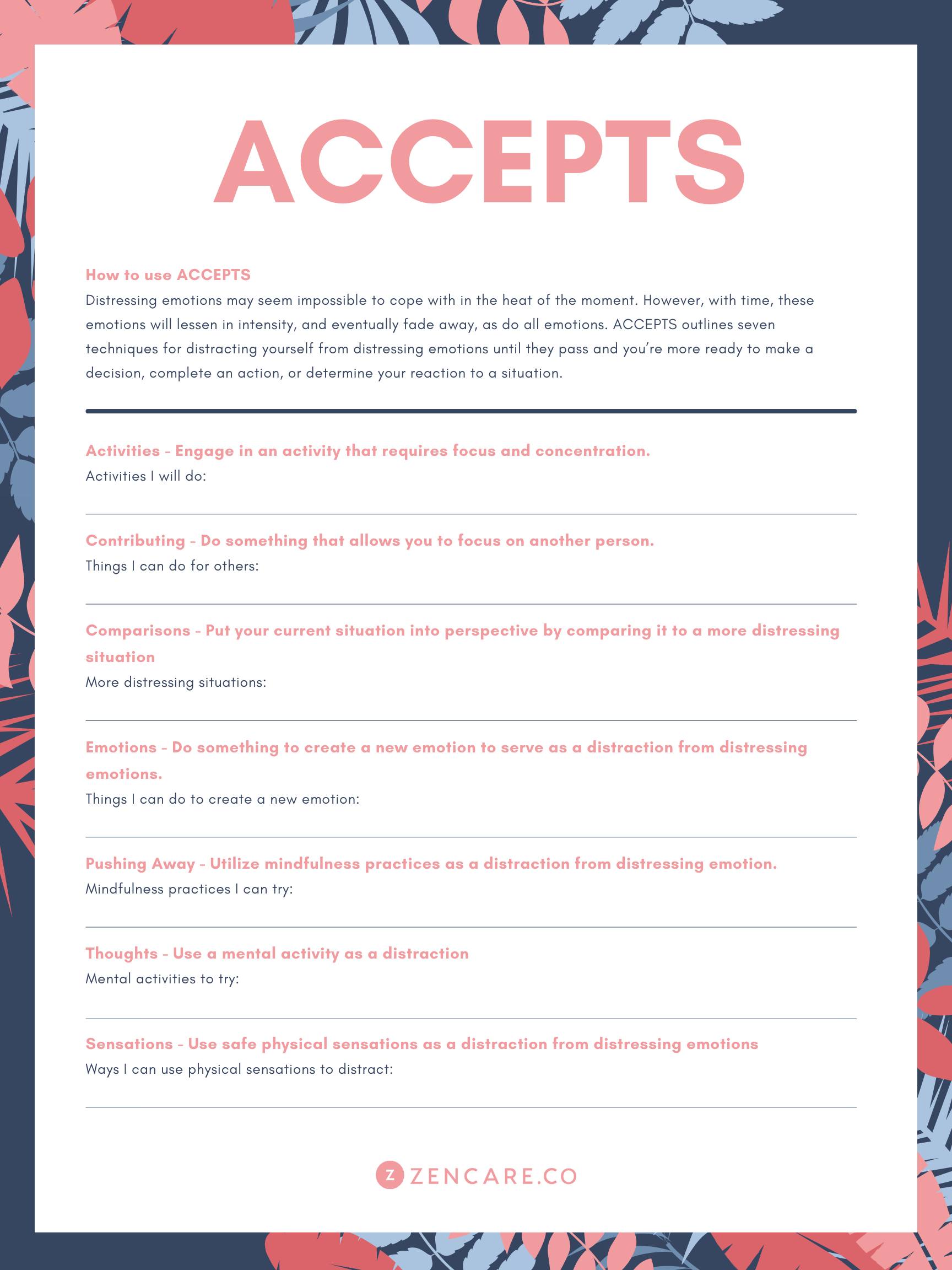There are many excellent tools that therapists use to teach clients the skills they need to manage their emotional reactions. One such tool is an acronym called ACCEPTS. ACCEPTS is a tool used in Dialectical Behavioral Therapy (DBT) to promote distress tolerance. DBT is a type of therapy that teaches clients to balance and tolerate opposites while decreasing black-and-white thinking. DBT focuses on developing four central skill sets:
- Mindfulness
- Interpersonal effectiveness
- Emotional regulation
- Distress regulation
Distress tolerance tools, such as ACCEPTS, are intended to provide a distraction from stressors and help you to cope with challenging emotional situations one moment at a time.

Here are a few challenges and conditions that DBT can help with:
How to use ACCEPTS
Distressing emotions may seem impossible to cope with in the heat of the moment. However, with time, these emotions will lessen in intensity, and eventually fade away, as do all emotions. ACCEPTS outlines seven techniques for distracting yourself from distressing emotions until they pass and you’re more ready to make a decision, complete an action, or determine your reaction to a situation.
Activities
Engage in an activity that requires focus and concentration. This takes your attention away from the immediate emotional reaction, giving your brain time to process through the situation in the background while your focus is on something else. This could include:
- Reading a book
- Watching a movie
- Doing a crossword or Sudoku
- Exercising (that includes dancing in your bedroom!)
Contributing
Do something that allows you to focus on another person. By drawing your attention to an external place, you won’t feel as trapped in your mind as you would without this distraction. Consider the following ways to focus on other people:
- Volunteering
- Sending a thank you note
- Asking a friend about their day
- Donating items you’re no longer using
Comparisons
Put your current situation into perspective by comparing it to a more distressing situation. This perspective-taking can give you a fresh way to look at the situation -- and your reaction. Try out these ways of expanding your perspective:
- Reflecting on a time when things felt less hopeful and were more distressing
- Reminding yourself of your resilience and how you overcame that situation
Emotions
Do something to create a new emotion to serve as a distraction from distressing emotions. By allowing yourself to focus on other emotions, you’ll put space between yourself and what you’re upset about, giving it time to burn out. Here are a few ways to do so:
- If you’re sad, watch a funny movie
- If you’re angry, do an extensive workout
- If you’re anxious, try out a new recipe
Pushing away
Utilize mindfulness practices as a distraction from distressing emotion. This also gives your brain another place to go besides dwelling on your immediate emotional reactions to the situation -- think of it as a small vacation for your brain! There are many excellent mindfulness practices to try, including:
- Guided imagery
- Mediation
- Mindful breathing
Thoughts
Use a mental activity as a distraction. When your brain is busy problem-solving or completing a mentally taxing activity, it can better avoid thinking about your emotional reaction. Try any of these ways to distract your mind:
- Name objects around you starting with the letter A, B, C, etc.
- Anxiety 5, 4, 3, 2, 1
- Do a crossword or sudoku
- Find some riddles online to work through
Sensations
Use safe physical sensations as a distraction from distressing emotions. This takes your attention outwards, away from your mind and more into your body. We have five senses to pick from, so find the activity that works best for you:
- Hold an ice cube
- Eat something spicy or sour
- Take a cold shower
- Listen to music
- Look at a vibrant piece of art
Consider seeking support from a therapist
This tool can be developed and utilized outside the therapy room; however, it is often difficult to regulate our distressing emotions on our own. A therapist who specializes in DBT can work with you to provide a variety of distress regulation tools. They’ll work with you to determine what are authentic, effective ways to distract yourself and to manage your emotions. Therapists who are experts in DBT will help you brainstorm the best plan for you.
